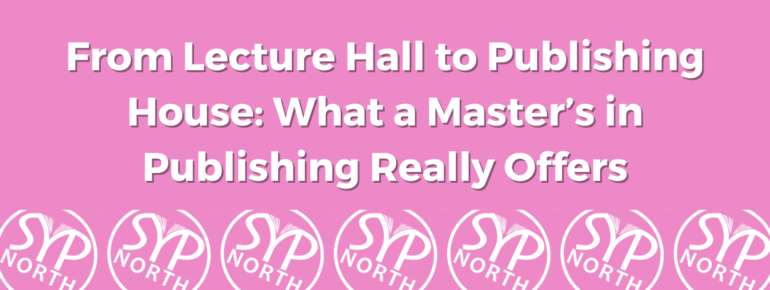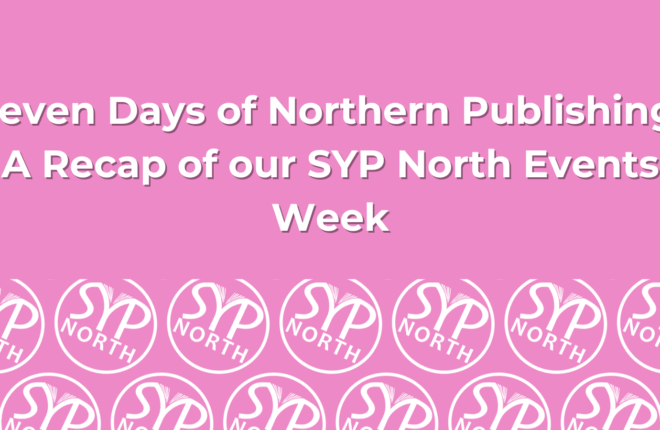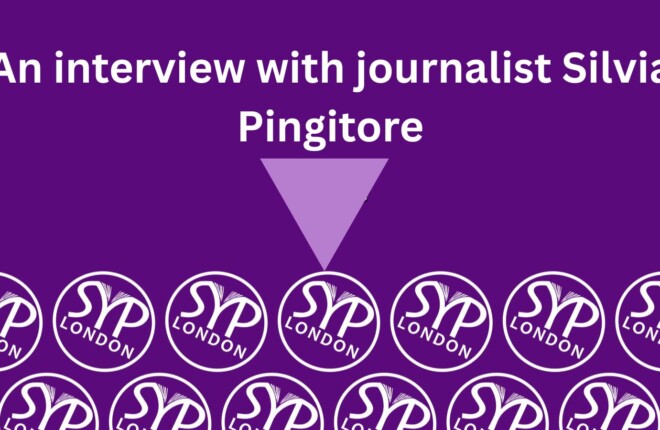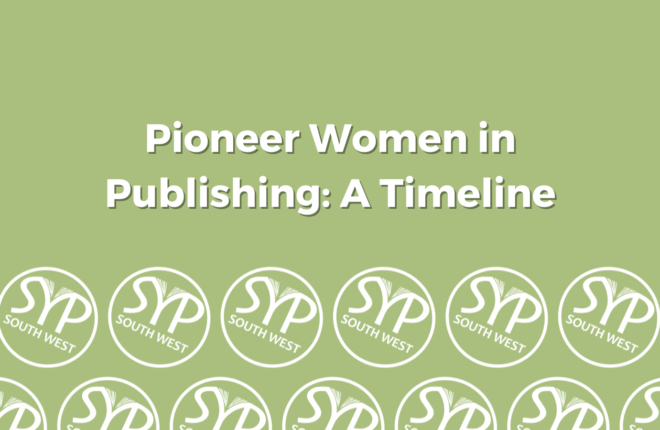
From Lecture Hall to Publishing House: What a Master’s in Publishing Really Offers
Posted on April 7, 2025 in INTO, North

Breaking into the publishing industry is a daunting prospect. It’s a notoriously competitive field and, for those outside of London, opportunities can feel scarce. Many entry-level roles demand far more than just entry-level experience, leaving aspiring publishers wondering what the best way in is. One increasingly popular route is a Publishing Master’s degree, promising structured learning, industry connections, and practical experience. But is it worth the investment?
For years, publishing was seen as an industry you simply ‘fell into,’ learning on the job. Postgraduate degrees weren’t deemed essential, and were even frowned upon in some cases. However, as the industry evolves, more employers seem to be recognising their value. A Publishing MA offers a broad understanding of the industry, from editorial and marketing to production and rights. It can also act as a crucial stepping stone for those unsure about which publishing path to take.
That said, a master’s is both a financial and time commitment and doesn’t guarantee a job. So, is a Publishing MA the best way in, or would volunteering, internships, or even bookselling be a better use of time and money?
To answer this, I spoke to Nadia Gustab, a Publishing MA student at Northumbria University, who is now in her final semester. Through her insights, we’ll explore what a Publishing MA really offers and whether it’s the optimal route into the industry.
What made you decide to pursue a Master’s in Publishing?
After graduating from Newcastle University with a degree in English Literature and Language, I felt lost on which pathway to take. I found the Publishing MA at Northumbria by complete luck. The novel Book Lovers by Emily Henry inspired me to just apply to it, the only publishing course in the North with a placement. I was completely sold as I’ve always loved books and it’s a dream of mine to work with them.
Did you consider other routes into publishing, such as internships, voluntary work, or entry-level jobs, before choosing the master’s?
I never really considered any other route. I’ve learned during my MA that it’s extremely difficult for talent in the North to enter the publishing industry as it’s heavily reliant on contacts and moving to London. Companies like Hachette are trying to change this through building new offices throughout Northern England, and New Writing North are providing opportunities and advice on breaking into the industry.
What has the experience of studying for a Publishing MA been like so far?
Honestly, it’s been eye-opening as someone who barely knew anything about the industry. I was provided so many opportunities to attend events, including the London Book Fair and visiting the Carmelite Hachette headquarters in London. I learned about different departments and spoke to many professionals who inspired me and built my passion for publishing further.
What does a typical week on the course look like for you?
The course doesn’t have many classroom hours. In first semester I had six hours a week and four hours in second semester. My placement required sixty+ hours between February and March which made these months extremely busy for me. There are modules that introduce you to the basics of publishing a novel, and I gave a few presentations practising to pitch my own book ideas, which was really fun. Second semester has the placement, dissertation module and a lecture covering the struggles of the industry, such as legal rights and underpaying authors.
What key skills do you feel like you have gained from the course?
The biggest skill I gained is preparation as I feel very aware of how the industry works now. I feel that as I finish my degree, I will know exactly how to go about interviews and getting started in a job. I’ve also attended many in-house meetings with Hachette, so I’m familiar with what each department does, what they speak about, how they acquire books and create covers, as well as how to present ideas of my own.
Can you tell me more about your placement? How do you think it has helped you prepare for a career in publishing?
My placement was incredibly valuable because, as someone from a working-class Northern background, I wouldn’t be able to get the contacts and meet people organically. Through the placement, I’ve already introduced myself and established relationships. This puts me on a level playing field with someone from London who might be around those circles already.
How much industry involvement is there? Have you had guest speakers or networking opportunities?
There are so many people that visited us. In first semester, every week someone new would come in, all from different departments from Hachette imprints and independent publishers. A lot of them brought free copies of unreleased books, as well as already published books. We had managers and executives from Hachette speak to us and answer questions.
The involvement is incredible. With the placement I had a key contact who was an editor at Hachette, we met every week or two to talk. She’d organise one-on-one, hour-long meetings for me with different managers, from editorial to rights to marketing. They’re all really helpful and lovely, and most just love advising students. When I went to the London office, I already recognised most people from the conversations we’d had.
Does your course offer any hands-on publishing projects, like working on a student-run magazine or book project?
New Writing North, which supports the MA, offers opportunities to write blog posts for them. Other than that, not really, but that would be really good for me to recommend for the future.
Has the course helped you build a professional network within the industry?
Not exactly. Despite meeting many people through the placement, it has always been stressed that it’s a professional relationship and wouldn’t be appropriate to message them outside of uni asking for jobs. So despite meeting people, I don’t think it would help with getting into the industry.
Do you feel like the course has given you a realistic understanding of the publishing industry and what it is like to work within it?
Definitely, especially since the lecturers didn’t paint a rose-tinted image of the industry. They exposed struggles faced by publishers, authors, and agents, including low pay, authors being disappointed with the reality of backlist titles not receiving as much attention or budgeting as others, and the extremely long hours editors often work.
Master’s degrees can be expensive, especially today – do you think the course has been worth the cost so far?
Oh, yes. I only had a loan of about £12,500 and over £11,000 went towards the degree cost, so I had to work part-time to cover rent. However, with the amount of events, opportunities and trips I went on, it was definitely worth it. I see it as an investment for the future and preparing for a career which I otherwise wouldn’t know how to get into.
Have any of your classmates already secured jobs or internships as a direct result of the MA?
We’ve been told not to apply until we’ve finished the degree as many jobs require you to join immediately. I know one alumnus who did this MA two years ago, and who now works in the London office, was required to move there in just a week or so. An Editorial Assistant told me that when she received the job offer, they said they’d only offer it to her if she moved to London the day after her degree ended.
Do you currently think having a Master’s degree significantly improves your chances of getting a job in publishing?
From what I’ve heard from current publishers at Hachette, some have MA degrees in Publishing, others have degrees in History or Law and just happened to find a job in publishing. It’s such an interesting industry, there really aren’t any specific qualifications you need to get in other than maybe a degree in something. It’ll be a stepping stone, like internships are for some, but everyone gets into the industry through different angles. I know that people in bookselling jobs, such as Waterstones booksellers, have high chances of being in publishing, so that’s good experience they look for.
What advice would you give to someone wanting to get into the industry and considering a publishing MA?
It’s definitely worth it. I’ve had friends on the course who tried their luck getting into publishing, but decided to do the MA after struggling for a while. It’ll be worth your time, especially with the placement, the number of people you meet, and events you attend. Saying this, it isn’t necessary at all – a job in Waterstones could work just as well.
For alternative paths into publishing, you may find these SYP resources helpful:
- Breaking into publishing: 5 tips for the job hunt – The Society of Young Publishers (2023)
- Volunteering Opportunities in Publishing – The Society of Young Publishers (2024)
- Where do I start? Developing skills for an entry-level role in publishing – The Society of Young Publishers (2024)
Written by Sophie Austen




 Listen to the podcast
Listen to the podcast  Explore the Youtube channel
Explore the Youtube channel